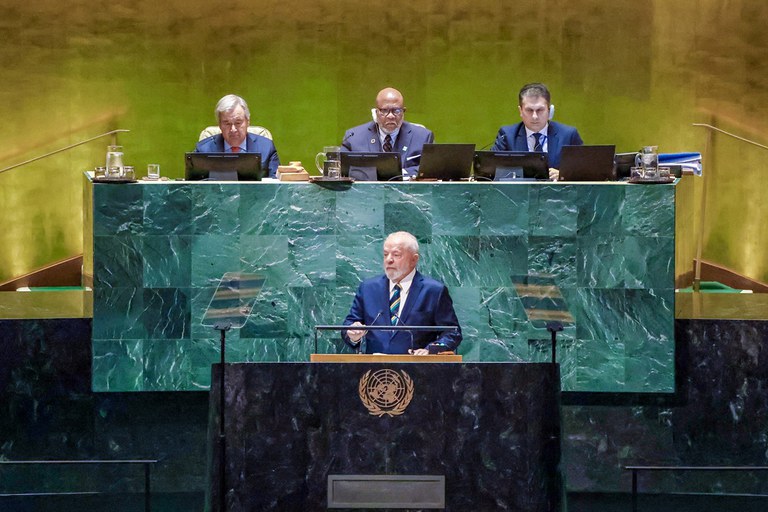Notícias
FOREIGN AFFAIRS
Dialogue is the main tool towards peace, says Lula at the UN General Assembly

Brazil’s president speaks at the opening of the 78th UN General Assembly in New York. PR/Ricardo Stuckert
When speaking at the opening of the 78th UN General Assembly at the UN headquarters in New York this Tuesday (19), Brazil’s President Luiz Inácio Lula da Silva made an appeal: that the world unite around a proposed dialogue for the solution of ongoing armed conflicts and humanitarian crises across the planet.
There will be no sustainability or prosperity without peace. Armed conflicts are an insult to human rationality. We do not underestimate how hard it is to achieve peace – but no solution will be lasting if not based on dialogue”
Luiz Inácio Lula da Silva, president of Brazil
“There will be no sustainability or prosperity without peace. Armed conflicts are an insult to human rationality. We do not underestimate how hard it is to achieve peace – but no solution will be lasting if not based on dialogue,” said Lula.
» President Lula’s full speech
» High resolution photographs (Flickr)
» At the UN, Lula pays tribute to the victims of catastrophes and defends humanitarian causes
As well as the war between Russia and Ukraine – which destabilizes Europe and has repercussions around the world – the Brazilian president mentioned several other conflicts that threaten global stability.
“It is disturbing to see that old unresolved disputes persist, and that new threats are emerging or gaining force. The difficulty of guaranteeing the creation of a state for the Palestinian people clearly demonstrates this. Added to this are the persistence of the humanitarian crisis in Haiti, the conflict in Yemen, threats to Libya's national unity and institutional ruptures in Burkina Faso, Gabon, Guinea-Conakry, Mali, Niger and Sudan. In Guatemala, there is the risk of a coup which would prevent the winner of democratic elections from taking office. The war in Ukraine exposes our collective inability to make the purposes and principles of the UN Charter prevail,” he said.
When mentioning the funds that wars have recently consumed – over 2 trillion dollars in military spending last year, and 83 billion dollars on nuclear weapons, equivalent to twenty times the UN’s regular budget – Lula declared that the world must make a choice if it wants to effectively build efficient and lasting peace processes.
“I have reiterated that work needs to be done to create space for negotiations. A lot is being invested in weaponry and very little in development. The UN was born to be the home of understanding and dialogue. The international community must choose: on the one hand there is the expansion of conflicts, the deepening of inequalities and the erosion of the rule of law. On the other, the renewal of multilateral institutions dedicated to promoting peace.”
SANCTIONS – President Lula also defended Cuba and took a stand against unilateral sanctions which, to him, “cause great harm to the population of affected countries” and which, “beyond not achieving their alleged objectives, hinder processes for mediation, prevention and peaceful resolution of conflicts.”
“Brazil will continue to decry measures that are taken without support from the UN Charter – such as the economic and financial embargo imposed on Cuba and the attempt to classify the country as a sponsor of terrorism. We will remain critical of any attempt to divide the world into zones of influence and to renew the Cold War,” he stressed.
SECURITY COUNCIL – When addressing the UN Security Council – whose objective is to ensure the maintenance of peace and international security –, Lula once again defended its reformulation and adaptation to third millennium needs.
“The UN Security Council has been progressively losing credibility. This frailty arises particularly from the actions of its permanent members, who wage unauthorized wars in search of territorial expansion or regime change. The Security Council's paralysis is the most eloquent proof of the need and the urgency of reform, to afford it greater representativeness and effectiveness,” Lula highlighted.

